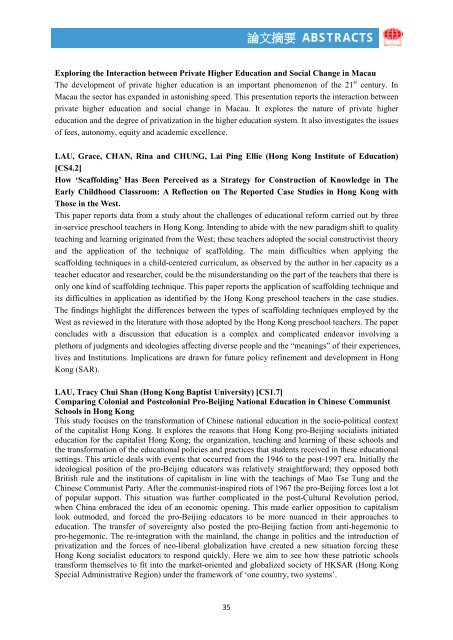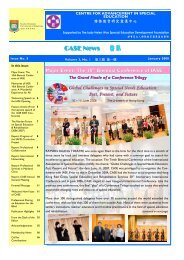ABSTRACTS - Faculty of Education - The University of Hong Kong
ABSTRACTS - Faculty of Education - The University of Hong Kong
ABSTRACTS - Faculty of Education - The University of Hong Kong
Create successful ePaper yourself
Turn your PDF publications into a flip-book with our unique Google optimized e-Paper software.
35<br />
論文摘要 <strong>ABSTRACTS</strong><br />
Exploring the Interaction between Private Higher <strong>Education</strong> and Social Change in Macau<br />
<strong>The</strong> development <strong>of</strong> private higher education is an important phenomenon <strong>of</strong> the 21 st century. In<br />
Macau the sector has expanded in astonishing speed. This presentation reports the interaction between<br />
private higher education and social change in Macau. It explores the nature <strong>of</strong> private higher<br />
education and the degree <strong>of</strong> privatization in the higher education system. It also investigates the issues<br />
<strong>of</strong> fees, autonomy, equity and academic excellence.<br />
LAU, Grace, CHAN, Rina and CHUNG, Lai Ping Ellie (<strong>Hong</strong> <strong>Kong</strong> Institute <strong>of</strong> <strong>Education</strong>)<br />
[CS4.2]<br />
How ‘Scaffolding’ Has Been Perceived as a Strategy for Construction <strong>of</strong> Knowledge in <strong>The</strong><br />
Early Childhood Classroom: A Reflection on <strong>The</strong> Reported Case Studies in <strong>Hong</strong> <strong>Kong</strong> with<br />
Those in the West.<br />
This paper reports data from a study about the challenges <strong>of</strong> educational reform carried out by three<br />
in-service preschool teachers in <strong>Hong</strong> <strong>Kong</strong>. Intending to abide with the new paradigm shift to quality<br />
teaching and learning originated from the West; these teachers adopted the social constructivist theory<br />
and the application <strong>of</strong> the technique <strong>of</strong> scaffolding. <strong>The</strong> main difficulties when applying the<br />
scaffolding techniques in a child-centered curriculum, as observed by the author in her capacity as a<br />
teacher educator and researcher, could be the misunderstanding on the part <strong>of</strong> the teachers that there is<br />
only one kind <strong>of</strong> scaffolding technique. This paper reports the application <strong>of</strong> scaffolding technique and<br />
its difficulties in application as identified by the <strong>Hong</strong> <strong>Kong</strong> preschool teachers in the case studies.<br />
<strong>The</strong> findings highlight the differences between the types <strong>of</strong> scaffolding techniques employed by the<br />
West as reviewed in the literature with those adopted by the <strong>Hong</strong> <strong>Kong</strong> preschool teachers. <strong>The</strong> paper<br />
concludes with a discussion that education is a complex and complicated endeavor involving a<br />
plethora <strong>of</strong> judgments and ideologies affecting diverse people and the “meanings” <strong>of</strong> their experiences,<br />
lives and Institutions. Implications are drawn for future policy refinement and development in <strong>Hong</strong><br />
<strong>Kong</strong> (SAR).<br />
LAU, Tracy Chui Shan (<strong>Hong</strong> <strong>Kong</strong> Baptist <strong>University</strong>) [CS1.7]<br />
Comparing Colonial and Postcolonial Pro-Beijing National <strong>Education</strong> in Chinese Communist<br />
Schools in <strong>Hong</strong> <strong>Kong</strong><br />
This study focuses on the transformation <strong>of</strong> Chinese national education in the socio-political context<br />
<strong>of</strong> the capitalist <strong>Hong</strong> <strong>Kong</strong>. It explores the reasons that <strong>Hong</strong> <strong>Kong</strong> pro-Beijing socialists initiated<br />
education for the capitalist <strong>Hong</strong> <strong>Kong</strong>; the organization, teaching and learning <strong>of</strong> these schools and<br />
the transformation <strong>of</strong> the educational policies and practices that students received in these educational<br />
settings. This article deals with events that occurred from the 1946 to the post-1997 era. Initially the<br />
ideological position <strong>of</strong> the pro-Beijing educators was relatively straightforward; they opposed both<br />
British rule and the institutions <strong>of</strong> capitalism in line with the teachings <strong>of</strong> Mao Tse Tung and the<br />
Chinese Communist Party. After the communist-inspired riots <strong>of</strong> 1967 the pro-Beijing forces lost a lot<br />
<strong>of</strong> popular support. This situation was further complicated in the post-Cultural Revolution period,<br />
when China embraced the idea <strong>of</strong> an economic opening. This made earlier opposition to capitalism<br />
look outmoded, and forced the pro-Beijing educators to be more nuanced in their approaches to<br />
education. <strong>The</strong> transfer <strong>of</strong> sovereignty also posted the pro-Beijing faction from anti-hegemonic to<br />
pro-hegemonic. <strong>The</strong> re-integration with the mainland, the change in politics and the introduction <strong>of</strong><br />
privatization and the forces <strong>of</strong> neo-liberal globalization have created a new situation forcing these<br />
<strong>Hong</strong> <strong>Kong</strong> socialist educators to respond quickly. Here we aim to see how these patriotic schools<br />
transform themselves to fit into the market-oriented and globalized society <strong>of</strong> HKSAR (<strong>Hong</strong> <strong>Kong</strong><br />
Special Administrative Region) under the framework <strong>of</strong> ‘one country, two systems’.
















